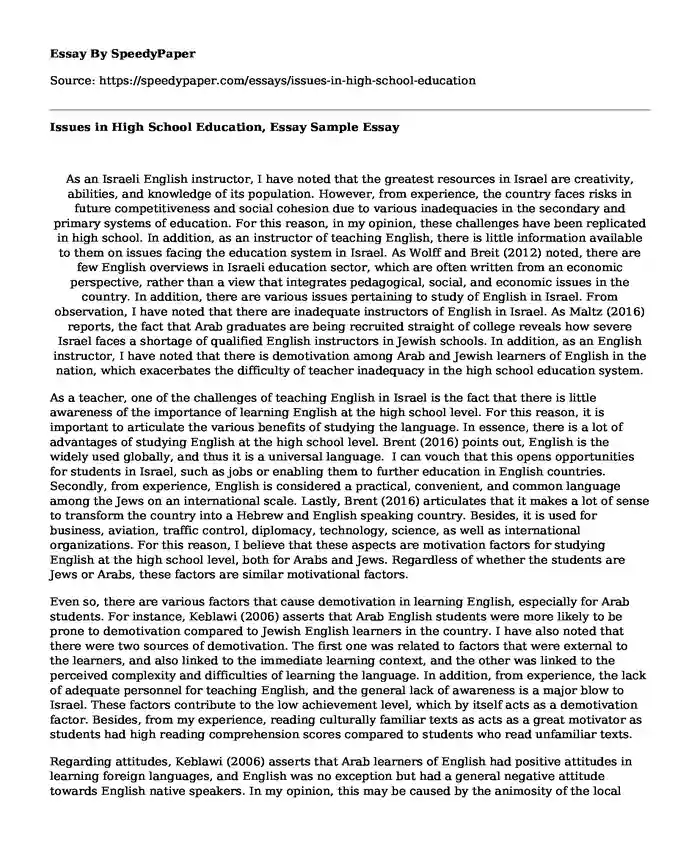
| Type of paper: | Essay |
| Categories: | High School Education Students School |
| Pages: | 3 |
| Wordcount: | 809 words |
As an Israeli English instructor, I have noted that the greatest resources in Israel are creativity, abilities, and knowledge of its population. However, from experience, the country faces risks in future competitiveness and social cohesion due to various inadequacies in the secondary and primary systems of education. For this reason, in my opinion, these challenges have been replicated in high school. In addition, as an instructor of teaching English, there is little information available to them on issues facing the education system in Israel. As Wolff and Breit (2012) noted, there are few English overviews in Israeli education sector, which are often written from an economic perspective, rather than a view that integrates pedagogical, social, and economic issues in the country. In addition, there are various issues pertaining to study of English in Israel. From observation, I have noted that there are inadequate instructors of English in Israel. As Maltz (2016) reports, the fact that Arab graduates are being recruited straight of college reveals how severe Israel faces a shortage of qualified English instructors in Jewish schools. In addition, as an English instructor, I have noted that there is demotivation among Arab and Jewish learners of English in the nation, which exacerbates the difficulty of teacher inadequacy in the high school education system.
As a teacher, one of the challenges of teaching English in Israel is the fact that there is little awareness of the importance of learning English at the high school level. For this reason, it is important to articulate the various benefits of studying the language. In essence, there is a lot of advantages of studying English at the high school level. Brent (2016) points out, English is the widely used globally, and thus it is a universal language. I can vouch that this opens opportunities for students in Israel, such as jobs or enabling them to further education in English countries. Secondly, from experience, English is considered a practical, convenient, and common language among the Jews on an international scale. Lastly, Brent (2016) articulates that it makes a lot of sense to transform the country into a Hebrew and English speaking country. Besides, it is used for business, aviation, traffic control, diplomacy, technology, science, as well as international organizations. For this reason, I believe that these aspects are motivation factors for studying English at the high school level, both for Arabs and Jews. Regardless of whether the students are Jews or Arabs, these factors are similar motivational factors.
Even so, there are various factors that cause demotivation in learning English, especially for Arab students. For instance, Keblawi (2006) asserts that Arab English students were more likely to be prone to demotivation compared to Jewish English learners in the country. I have also noted that there were two sources of demotivation. The first one was related to factors that were external to the learners, and also linked to the immediate learning context, and the other was linked to the perceived complexity and difficulties of learning the language. In addition, from experience, the lack of adequate personnel for teaching English, and the general lack of awareness is a major blow to Israel. These factors contribute to the low achievement level, which by itself acts as a demotivation factor. Besides, from my experience, reading culturally familiar texts as acts as a great motivator as students had high reading comprehension scores compared to students who read unfamiliar texts.
Regarding attitudes, Keblawi (2006) asserts that Arab learners of English had positive attitudes in learning foreign languages, and English was no exception but had a general negative attitude towards English native speakers. In my opinion, this may be caused by the animosity of the local Israeli population towards British mandate rule that was formerly used. For this reason, regardless of the part of Israel, similar attitudes towards English can be noted. However, both Arab and Jewish students had similar attitudes towards learning English in that it was perceived to be difficult. In addition, the lack of awareness can also be attributed to demotivation, Once the students learn the importance of the Language, there is a high possibility that they will have positive attitudes towards it.
References
Brent, J. (2016). English can be the official second language of Israel. Retrieved from http://www.jewishjournal.com/opinion/article/english_can_be_the_official_second_language_of_israel
Keblawi, F. (2006). Motivational orientations, attitudes, and demotivation: A case study of Muslim Arab learners of English in public schools in Northern Israel (Doctoral dissertation, University of Aberdeen).
Maltz, J. (2016). With Qualified English Teachers in Short Supply, Israel’s Jewish Schools Start Courting Arabs. Retrieved from http://www.haaretz.com/israel-news/.premium-1.735885
Wolff, L., & Breit, E. (2012). Education in Israel: the challenges ahead. University of Maryland. Institute for Israel Studies Research Paper. Retrieved from http://israelstudies.umd.edu/pdf/Larry%20Wolff%20Research%20Paper%20-%20May%202012%20-%20Updated.pdf
Cite this page
Issues in High School Education, Essay Sample. (2017, Nov 20). Retrieved from https://speedypaper.com/essays/issues-in-high-school-education
Request Removal
If you are the original author of this essay and no longer wish to have it published on the SpeedyPaper website, please click below to request its removal:
- Essay Example on Plato's Republic
- Free Essay on the United States Role in the World in the Early Twentieth-Century
- The Implementation of a Health Monitoring System, Essay Example
- What Not to Do When Testifying, Law Essay Example
- Essay Sample: Different Methods of Establishing the Reliability of a Psychological Instrument
- HR Management Essay Example on Theories X, Y, Z
- Free Essay Example. Asian Turtle
Popular categories




